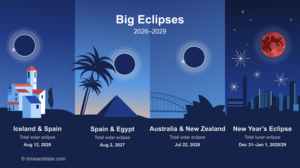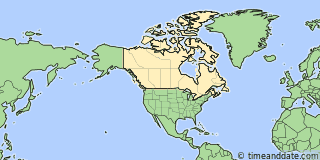| Current Time: | Sep 10, 2025 at 1:16:03 pm |
|---|---|
| Moon Direction: | ↑ 329° Northwest |
| Moon Altitude: | -25.3° |
| Moon Distance: | 364,802 km |
| Next New Moon: | Sep 21, 2025, 3:54 pm |
| Next Full Moon: | Oct 6, 2025, 11:47 pm |
| Next Moonrise: | Today, 8:16 pm |
Moonrise, Moonset, and Phase Calendar for Bécancour, January 2025
Scroll right to see more
| 2025 | Moonrise/Moonset | Meridian Passing | ||||||||
|---|---|---|---|---|---|---|---|---|---|---|
| Jan | Moonrise | Moonset | Moonrise | Time | Distance (km) | Illumination | ||||
| 1 | 9:16 am | ↑ (126°) | 6:00 pm | ↑ (236°) | - | 1:34 pm | (19.6°) | 379,234 | 4.0% | |
| 2 | 9:45 am | ↑ (119°) | 7:19 pm | ↑ (244°) | - | 2:27 pm | (24.3°) | 376,372 | 9.6% | |
| 3 | 10:08 am | ↑ (111°) | 8:39 pm | ↑ (253°) | - | 3:17 pm | (30.2°) | 374,102 | 17.4% | |
| 4 | 10:28 am | ↑ (101°) | 9:57 pm | ↑ (263°) | - | 4:05 pm | (36.8°) | 372,382 | 27.0% | |
| 5 | 10:45 am | ↑ (92°) | 11:14 pm | ↑ (274°) | - | 4:52 pm | (43.7°) | 371,175 | 37.9% | |
|
|
11:03 am | ↑ (82°) | - | - | 5:40 pm | (50.7°) | 370,435 | 49.5% | ||
| 7 | - | 12:33 am | ↑ (284°) | 11:23 am | ↑ (72°) | 6:29 pm | (57.3°) | 370,171 | 61.2% | |
| 8 | - | 1:53 am | ↑ (293°) | 11:45 am | ↑ (63°) | 7:21 pm | (63.1°) | 370,438 | 72.3% | |
| 9 | - | 3:15 am | ↑ (302°) | 12:14 pm | ↑ (56°) | 8:18 pm | (67.7°) | 371,341 | 82.2% | |
| 10 | - | 4:37 am | ↑ (309°) | 12:51 pm | ↑ (50°) | 9:17 pm | (70.7°) | 372,976 | 90.2% | |
| 11 | - | 5:53 am | ↑ (313°) | 1:41 pm | ↑ (47°) | 10:19 pm | (71.8°) | 375,415 | 95.9% | |
| 12 | - | 6:57 am | ↑ (313°) | 2:44 pm | ↑ (47°) | 11:20 pm | (70.9°) | 378,642 | 99.1% | |
|
|
- | 7:47 am | ↑ (311°) | 3:56 pm | ↑ (51°) | Moon does not pass the meridian on this day. | ||||
| 14 | - | 8:24 am | ↑ (306°) | 5:12 pm | ↑ (57°) | 12:17 am | (68.3°) | 382,544 | 99.8% | |
| 15 | - | 8:51 am | ↑ (299°) | 6:27 pm | ↑ (64°) | 1:10 am | (64.2°) | 386,882 | 97.9% | |
| 16 | - | 9:13 am | ↑ (291°) | 7:39 pm | ↑ (73°) | 1:58 am | (59.1°) | 391,365 | 93.9% | |
| 17 | - | 9:30 am | ↑ (283°) | 8:47 pm | ↑ (81°) | 2:42 am | (53.5°) | 395,638 | 88.2% | |
| 18 | - | 9:45 am | ↑ (274°) | 9:53 pm | ↑ (90°) | 3:23 am | (47.6°) | 399,355 | 80.9% | |
| 19 | - | 10:00 am | ↑ (266°) | 10:58 pm | ↑ (99°) | 4:03 am | (41.6°) | 402,187 | 72.6% | |
| 20 | - | 10:15 am | ↑ (258°) | - | 4:42 am | (35.8°) | 403,883 | 63.6% | ||
|
|
12:03 am | ↑ (107°) | 10:31 am | ↑ (250°) | - | 5:22 am | (30.2°) | 404,264 | 54.1% | |
| 22 | 1:10 am | ↑ (115°) | 10:49 am | ↑ (242°) | - | 6:04 am | (25.2°) | 403,257 | 44.4% | |
| 23 | 2:18 am | ↑ (122°) | 11:12 am | ↑ (236°) | - | 6:49 am | (20.8°) | 400,904 | 34.8% | |
| 24 | 3:27 am | ↑ (128°) | 11:42 am | ↑ (230°) | - | 7:38 am | (17.3°) | 397,349 | 25.6% | |
| 25 | 4:35 am | ↑ (132°) | 12:23 pm | ↑ (227°) | - | 8:31 am | (15.0°) | 392,867 | 17.2% | |
| 26 | 5:38 am | ↑ (134°) | 1:16 pm | ↑ (226°) | - | 9:27 am | (14.3°) | 387,808 | 10.0% | |
| 27 | 6:31 am | ↑ (133°) | 2:22 pm | ↑ (228°) | - | 10:24 am | (15.2°) | 382,619 | 4.5% | |
| 28 | 7:13 am | ↑ (129°) | 3:38 pm | ↑ (233°) | - | 11:22 am | (17.9°) | 377,724 | 1.0% | |
|
|
7:45 am | ↑ (122°) | 4:59 pm | ↑ (241°) | - | 12:17 pm | (22.2°) | 373,544 | 0.2% | |
| 30 | 8:11 am | ↑ (114°) | 6:21 pm | ↑ (250°) | - | 1:10 pm | (27.9°) | 370,366 | 2.0% | |
| 31 | 8:32 am | ↑ (105°) | 7:42 pm | ↑ (260°) | - | 2:00 pm | (34.5°) | 368,349 | 6.7% | |
| * All times are local time for Bécancour. They take into account refraction. Dates are based on the Gregorian calendar. Illumination is calculated at lunar noon. | ||||||||||
Jan | Feb | Mar | Apr | May | Jun | Jul | Aug | Sep | Oct | Nov | Dec
Elsewhere on mungfali.galihkartiwa07.workers.dev

4 Eclipses Not to Miss 2026–2029
Some eclipses, like this month’s partial solar eclipse, can be very elusive. We’ve compiled a list of upcoming eclipses you can get to in real life.

Skywatching Tips for September 2025
What’s up in the day and night sky in September 2025, including a Blood Moon and a partial lunar eclipse.

Moon Guide for September 2025
Discover the phases of the Moon in September 2025, plus a total lunar eclipse and the New Moon partially eclipsing the Sun.

Full Moon Names
Ancient cultures gave names to the Full Moon. These names are still in use today.
